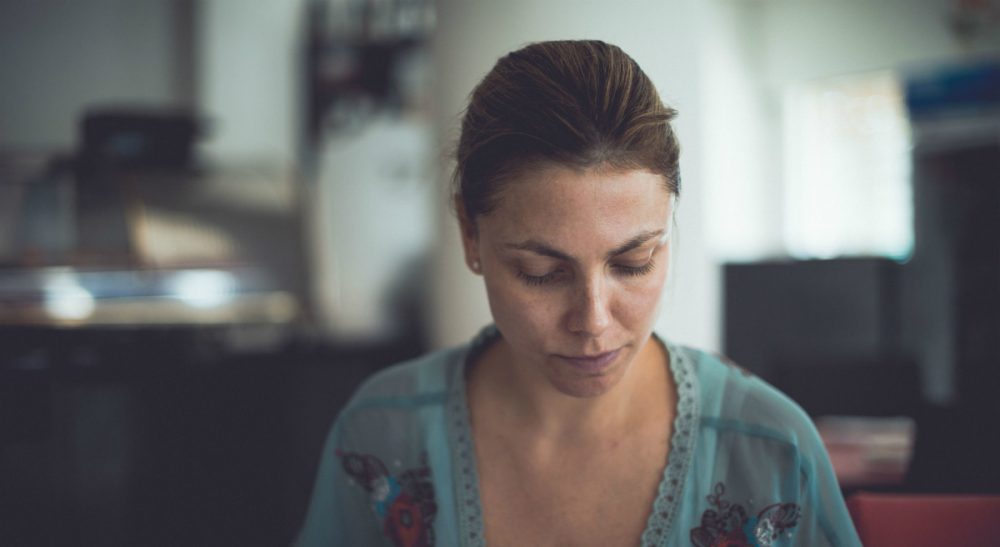Advertisement
Heavy Meddle: Should I Try To Convince My Sister To Have Potentially Life Saving Surgery?

Welcome Meddleheads, to the column where your crazy meets my crazy! Please send your questions to advice@wbur.org. Right now. Not only will you immediately feel much better, you’ll also get some advice.
Hugs,
Steve
…
Dear Steve,
Some members of my family carry a genetic mutation that has a strong correlation to breast and ovarian cancer, called a BRCA1 mutation — think Angelina Jolie. I do not have the mutation. But while waiting for the test result, I did a lot of research and felt confident that I would have prophylactic surgery to diminish my risk of ovarian cancer. My sister does not want those surgeries. It is a challenge to respect her decision and perspective when I don't understand it, because I was theoretically faced with the same prognosis. Of course, I could have felt differently if I had the mutation, but the heart of the discord is that I put more of my faith in science on this matter, while she has more faith in the human body. How can I understand and respect her decision when her views are so different from my own, and when I'm scared of losing her and fearful of the suffering that she may have to go through? Should I (or do I even have the right) to tell her my fears and concerns? Can I express those concerns in a way that doesn't pressure her or alienate her?
Signed,
Is It Really My Business, Anyway?
…
Dear Business,
I can’t imagine how frightening this must be for your sister, you and your whole family. Modern medical science is miraculous. It’s helped save millions of lives, including that of my mother, who has survived two cancers. I wouldn’t trade it for anything. But in cases like this, it has the complicated side effect of placing a sword of Damocles over a person who is, at the moment, perfectly healthy. It accelerates the process of contemplating mortality, fate and where to place our faith.
You’re right to admit that it’s impossible for you to assess what you would do if you were the one with the mutation. We just can’t know. And that should make us a bit more humble with our own hypothetical opinions. The situation Angelina Jolie describes is pretty extreme. She had a parent who died young of cancer, her own young children and an 87 percent chance of developing cancer, which a double mastectomy reduced to less than five percent. Most people would agree that she made a wise decision. But most of these situations are more nuanced. The percentage risk of cancer is usually lower, and the preventive surgery can be more invasive and, thus, dangerous. Suppose doctors told your sister she had a 50 percent chance of developing ovarian cancer, which could be cut in half with a hysterectomy? The risk equation becomes a lot murkier.
Psychologically, it’s hard for people to submit themselves to the trauma and danger of a major surgery based on the chance of developing an illness, even one as terrible as cancer.
Modern medical science is miraculous...But in cases like this, it has the complicated side effect of placing a sword of Damocles over a person who is, at the moment, perfectly healthy. It accelerates the process of contemplating mortality, fate, and where to place our faith.
So your sister has every right to make her own decision, because it is her body and her life. She’s an adult, and you have to respect her capacity to weigh the risks for herself. That being said, you have every right to react as you have — with confusion and distress.
Nobody has done anything “wrong.” The problem is, you’re in an awful situation. It’s rotten luck. Even worse, it’s uneven luck. By which I mean that your sister faces a higher risk of cancer than you do. This is hard to acknowledge, but it’s the unvarnished truth. And I suspect it’s part of what makes it difficult for you to share your feelings with your sister. (What right do I have to speak? I’m the lucky one!)
I would argue that you have not only the right, but also an obligation to reveal the contents of your heart to your sister. Your other choice is to withhold those volatile feelings, to bottle them up and allow them to corrode you from the inside out. What sense does that make? Your sister needs to know that you love her and that you’re frightened of losing her and frightened of the suffering she might endure. She needs to hear these things, because they are the truth of how you feel. You want your sister to live a long life. You don’t want her taken under by a horrible illness.
I’m not suggesting that such a discussion won’t have consequences. Your sister might very well feel pressured, because you do want her to have this surgery. You’re in conflict. And conflicts of this magnitude create friction and, in some cases, alienation.
So the question is how to prevent this outcome? You know your sister better than I do. As a rule, siblings tend to push each other’s buttons when they get angry and/or frightened, and they know where all the buttons are. So you should think about the right way to say what you need to say so that what she hears is love, not fear and disapproval.

Remember, though, it's not just about telling her how you feel. Listen to what she has to say. She has her own reasons for making this decision, and you need to hear them and respect her right to make them, even if they aren’t the ones you would make. Some part of you, for instance, may feel that your sister is avoiding the inevitable and being self-destructive, that she’s not "facing the facts.” It would be more helpful to see her as reacting to terrifying news as best she can and to empathize before you judge. A lot of love resides in acceptance.
A couple of other things worth remembering: First, just because your sister has decided not to have preventive surgery right now doesn’t mean she won’t change her mind. All this sounds quite fresh. People sometimes have to adjust internally. But she’s more likely to come to this decision on her own than to be pressured into it. After all, a big part of illness — even the threat of illness — involves the loss of control. When you become a patient, you feel that loss of control most acutely. Maybe she’s not ready for that right now. And maybe, as her internal and external circumstances change, she will be. Or maybe, as you note, she will continue to find her faith in a different location than you do. You may have to accept that decision as a part of who she is and love her despite it.
You should also consider your own motives here. Surely, there is some part of you that feels the same horrible loss of control as your sister, along with guilt. And perhaps your way of trying to control the situation is to compel your sister to get this surgery. The underlying fantasy is something like: If only I can convince my sister to have this surgery she won’t get cancer and die. This dream arises from your love, but also from your fear and your sense of helplessness.
To the extent you can, focus on the love and banish the rest. That’s what should matter right now. The specter of death has appeared in your lives and shaken both of you up. The expression of love doesn’t defeat death. But it does lend meaning to life.
No matter what the doctors say, no matter the percentages, our time on earth is limited. Our essential calling is not to make money or get famous or even cure cancer, but to love each other as purely and deeply as we can. Tell your sister what you need to tell her, but also tell her that.
Good luck to both of you,
Steve
♥
Okay folks, now it's your turn. Did I get it right, or muck it up? Let me know in the comments section. And please do send your own question along, the more detailed the better. Even if I don't have a helpful response, chances are someone in the comments section will. Send your dilemmas via email.
Steve Almond is the author of the forthcoming book Against Football.